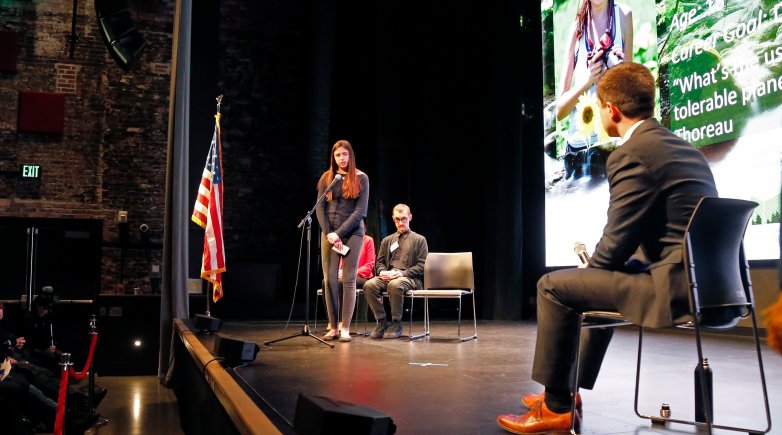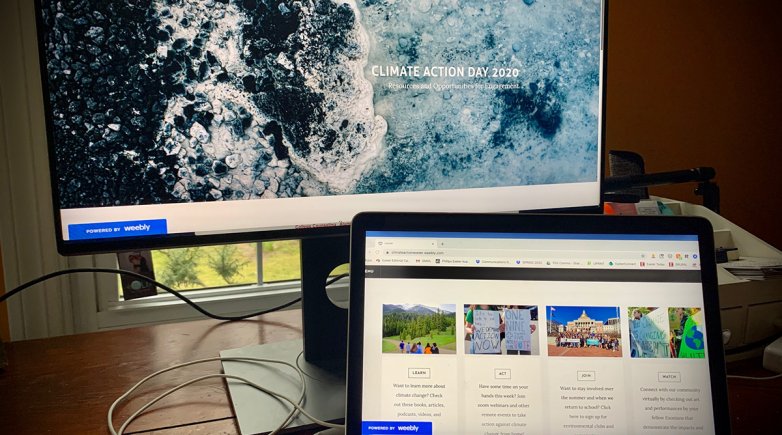Exonians urge climate commission to 'take the leap'
Members of the Exeter Climate Lobby ask a state committee to set a goal of net-zero greenhouse gas emissions by 2050.
When the ad-hoc committee tasked with setting carbon emissions goals for the state of New Hampshire met for the last time before making its recommendations, an Exonian full-court press awaited.
Six members of the Exeter Climate Lobby opened the public-comment period of the New Hampshire Emissions Commission meeting Nov. 12 with an orchestrated plea for net-zero greenhouse gas emissions by 2050.
The commission is made up of members of state agencies, utilities and the legislature, along with health, business and environmental advocates. Its mandate is to develop a report that identifies science-based emissions reduction goal for the state to achieve by 2030, 2040 and 2050. It will deliver its final report next month.
Following meeting procedures for Zoom video conferencing, the six Exeter students — seniors Bea Burack, Molly Durawa, Frankie Getman and Sadie Griffith; and preps Tenley Nelson and Sophie Zhu — remained cloaked by black screens with only their names visible to participants. But with impassioned voices, the six New Hampshire residents made their case to not “leave this a bigger mess than it needs to be for our generation to clean up.”
The following is a transcript of the Exeter Climate Lobby members’ remarks:
Bea: We’re so happy to be here with you all tonight and we’re grateful for the opportunity to share with you why it’s so important to us that you set a goal of net-zero greenhouse gas emissions by 2050. Being a young person, especially right now, means being familiar with change. We don’t know what our lives will look like even next month because of the pandemic, and we don’t know what they’ll look like in the coming years because of climate change.
Molly: Changes like these are scary, but we want you to know that when it comes to significant changes to our energy sector, to the way we travel, produce our food, manage our land, changes that will bring us to net-zero greenhouse gas emissions by 2050, we’re not scared. We’re hopeful. And we invite you to be hopeful as well.
Tenley: In previous meetings, some of you have expressed a sentiment that New Hampshire is too small to make any significant difference in worldwide greenhouse gas emissions so maybe we shouldn’t even try. But I believe that New Hampshire has an obligation to act on climate change, not just because it will be more costly in the long-term if we do nothing now, but because it’s the right thing to do.
Bea: My aunt and cousin work in the tourism industry up north, my uncle drives the snow cat at a ski area, and my cousin works in the maple syrup industry. Every day, New Hampshire citizens like them will be impacted so deeply and so heavily by climate change that we simply cannot throw up our hands and say there’s nothing we can do.
Frankie: Many of you may be feeling pressure to preserve the status quo, to set goals that are based on short-term concerns instead of the long-term challenges of climate change. But, as Mr. Colburn mentioned in the last meeting, if we don’t address problems like climate change head-on, quickly, and comprehensively, we just end up having to do it all over again.
Sadie: And as you consider how best to address climate change, we urge you to also keep in mind the disproportionate impact that climate change will have and is already having on low-income communities and communities of color. Any policies that New Hampshire enacts should be structured with the acknowledgement that not all New Hampshirites will have the same ability to adapt to climate change and changing economic circumstances.
Sophie: Science tells us that unless we make some big changes right now, climate change will become irreversible. Please — we’re begging you — don’t leave this a bigger mess than it needs to be for our generation to clean up. We don’t want to live in a world with more droughts, more flooding, shorter winters, and fewer jobs. What we want are deep, systemic policy changes that will lessen the impacts of climate change. We want New Hampshire to commit to reaching net-zero greenhouse gas emissions by 2050. It is in this kind of change that we see hope.
Bea: You all have the power to help make net-zero emissions by 2050 happen, to help us maintain hope that our children and their children will have a stable world to live in. So please, look at the facts, acknowledge what’s at stake, and take the leap. Thank you all so much for your time tonight. We look forward to reading your recommendations soon.



